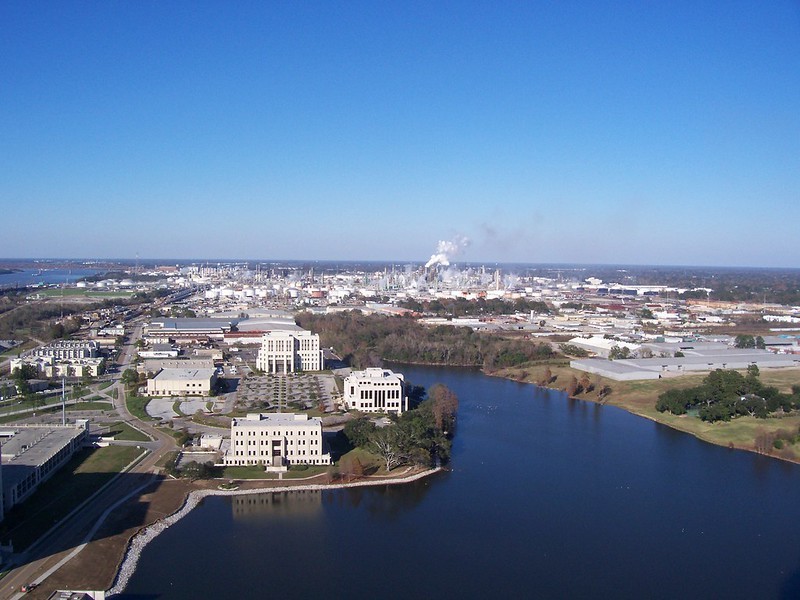Amnesty International published a report focusing on approximately 600 fossil fuel and petrochemical plants along the 84-kilometer-long Houston Ship Channel in Texas.
Human Rights Watch (HRW) analyzed the situation along what it referred to as ‘Cancer Alley,’ an approximately 140-kilometer stretch of communities along the banks of the Mississippi River between New Orleans and Baton Rouge, coexisting with some 200 fossil fuel and petrochemical operations.
Amnesty found that the Houston Ship Channel is mainly inhabited by Latinx/Hispanic and Black communities, which the human rights watchdog called “environmental racism.” Many residents suffer from asthma, lung cancer, recurrent breathing difficulties, and chronic coughing and have poor access to proper health care assistance.
The investigation, conducted between January and December 2023, examined facilities of multinational companies ExxonMobil’s Baytown Complex, LyondellBasell’s Channelview Complex, Shell’s Deer Park Chemicals, and Intercontinental Terminals Company’s (ITC) Deer Park. All four were found to have consistently exceeded allowed air pollution limits over the past 20 years. Within the last five years, three of the plants — ExxonMobil Baytown Complex, Shell’s Deer Park Chemicals, and ITC Deer Park — experienced fires or explosions.
The plants produce chemicals used to make everyday items like plastics, fertilizers, and pesticides sold to customers in the U.S. and worldwide, including some in the European Union countries.
Amnesty cited Dr. Loren Hopkins, the chief environmental science officer at the Houston Health Department, who claimed that a sixfold increase in ambulance-treated asthma attacks and a twofold increase in cardiac arrest rates were recorded in this area compared to the rest of Houston. Some neighborhoods were experiencing up to a 20-year lower average life expectancy compared to majority white communities 15 miles away.
“There are two pollutants that are a big concern in Houston in terms of cancer. One is benzene, and the other one is 1,3-butadiene… We really don’t know what happens when a person breathes both of them together. Whether the risk is additive, whether it’s multiplicative,” she told the non-profit organization Public Health Watch in 2022.
According to the interviewed residents, the chemical odor in the area is unbearable. Children are particularly affected. A study conducted by the University of Texas School of Public Health revealed increased instances of childhood leukemia in areas of Houston where the concentrations of benzene and 1,3-butadiene were highest, said Amnesty.
Amnesty’s research claims that the Texas Commission on Environmental Quality (TCEQ) — the environmental regulatory agency responsible for enforcing environmental laws and regulations within the state — renews plant permits despite pollution violations, approves expansion plans, and issues fines below deterrent levels.
“A company gets fined less than one person who’s affected by it would spend on medical bills… it’s very unfair,” said Carolyn Stone, a local resident. Additionally, companies can exploit a Texas loophole, with TCEQ granting an "unplanned and unavoidable" air pollution exemption in over 85% of cases from 2017 to 2021.
Amnesty shared the responses of the companies, which said the watchdog should look into their safety policies. Shell’s Deer Park Chemicals stated that their “employees and contractors are empowered with the authority and responsibility to stop work if they believe the conditions are unsafe.” LyondellBasell’s Channelview Complex did not consider Amnesty's report to be "accurate and fair."
Similarly, in Louisiana's Cancer Alley residents experience extreme pollution from fossil fuel and petrochemical operations, resulting in elevated risks of maternal, reproductive, and newborn health harms, cancer, and respiratory issues, as stated by the HRW report. Black residents in Cancer Alley disproportionately bear the impact of these health hazards.
The Louisiana Department of Environmental Quality (LDEQ) denied claims that residents in Cancer Alley face higher cancer risks due to pollution. LDEQ spokesperson Greg Langley disputed the term "Cancer Alley," stating that it doesn't accurately reflect the cancer rates along the industrial corridor between Baton Rouge and New Orleans.
However, Kimberly Terrell, a research scientist and director from Tulane University's Environmental Law Clinic, disagreed with the LDEQ, emphasizing that the department doesn’t take into account how close people live to these industries and that the industries that pollute the most are concentrated where Black communities live, pointing out the systemic racism in LDEQ’s business decisions.
Research from Tulane University in New Orleans has exposed the severe impact of air pollution on maternal and newborn health in Cancer Alley. The study reveals significantly elevated rates of low birthweight and preterm birth, up to triple the U.S. average, in areas with the highest air pollution levels, particularly within Cancer Alley.
“We’re dying from inhaling the industries’ pollution. I feel like it’s a death sentence. Like we are getting cremated, but not getting burnt,” said Sharon Lavigne, 71, to HRW.



